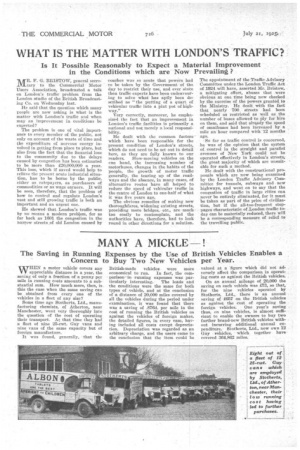WHAT IS THE MATTER WITH LONDON'S TRAFFIC?
Page 24

If you've noticed an error in this article please click here to report it so we can fix it.
Is It Possible Reasonably to Expect a Material Improvement in the Conditions which are Now Prevailing ?
1TR. F. G: BRISTOW, general secreIV_Ltary to the Commercial Motor Users Association, broadcasted a talk on London's traffic problem from the London studio of the British Broadcasting Co. on Wednesday last.
He said that the question which many people are now asking is what is the matter with London's traffic and when may an improvement in conditions be expected?
The problem is one of vital importance to every member of the public, not only on account of the waste of time and the expenditure of nervous energy involved in getting from place to place, but also from the fact that the financial loss to the community due to the delays caused by congestion has been estimated to be more than £20,000,000 a year. This loss, which if saved would help to relieve the present acute industrial situation, has to be borne by the public, either as ratepayers, as purchasers of commodities or as wage earners. It will be seen, therefore, that the problem of how to control and regulate London's vast and still growing traffic is both an important and an urgent one.
He showed -that. London's traffic was by no means a modern problem, for so far back as 1601 the congestion in the narrow streets of old London caused by coaches was so acute that powers had to be taken by the Government of the day to restrict their use and ever since then traffic experts have been endeavouring to solve what has aptly been described as "the putting of a quart of vehicular traffic into a pint pot of highway."
Very correctly, moreover, he emphasized the fact that an improvement in Loucion's traffic facilities is primarily a national and not merely a local responsibility.
Be dealt with the common factors which have been responsible for the present condition of London's streets, which do not need to be set out in detail here, as they are fully known to our readers. Slow-moving vehicles on the cue hand, the increasing number of motorbuses, changes in the habits of the people, the growth of motor traffic generally, the tearing up of the roadways and the absence, in many cases, of alternative routes have all helped to reduce the speed of vehicular traffic in the centre of London to one-half of what it was five years ago.
The obvious remedies of making new thoroughfares, widening existing streets, Providing more bridges, etc., are much too costly to contemplate, and the authorities have, therefore, had to look round in other directions for a solution.
The appointment of the Traffic Advisory Committee under the London Traffic Act of 1924 will have, asserted Mr. Bristow, a mitigating effect, abuses that were obvious at one time being now checked by the exercise of the powers granted to the Ministry. He dealt with the fact that nearly 700 streets had been scheduled as restricted as well as the number of buses allowed to ply for hire on them, and said that already the speed of omnibuses had been increased by a mile an hour compared with 12 months ago.
• So far as traffic control is concerned, he was of the opinion that the system of control in the straight and parallel avenues of New York could not be operated effectively in London's streets, the great majority of which are unsuitable for such a method.
He dealt with the constructional proposals which are now being examined by the London Traffic Advisory Committee for tunnels, subways and new highways, and went on to say that the congestion of traffic in large cities can never be entirely eliminated, for it must be taken as part of the price of civilization, but if the all-too-frequent stoppages characteristic of Loudon traffic today can be materially reduced, there will be a corresponding measure of relict to the travelling public.
































